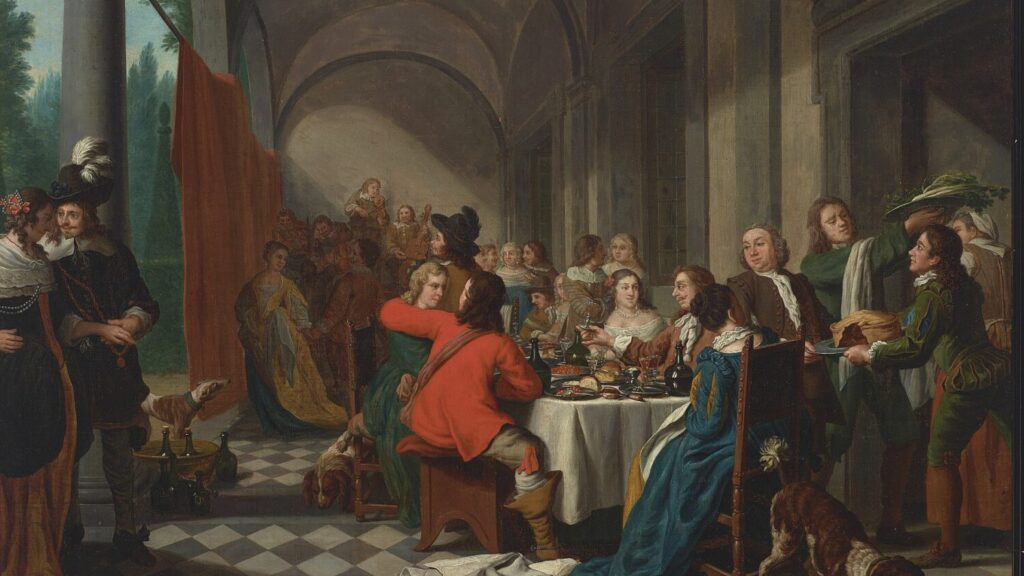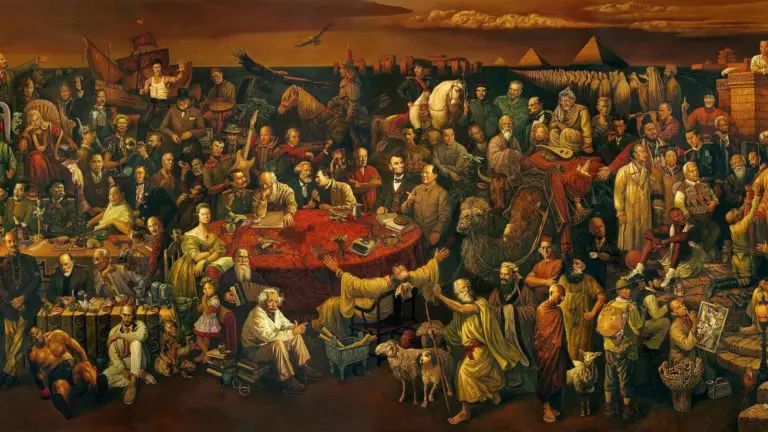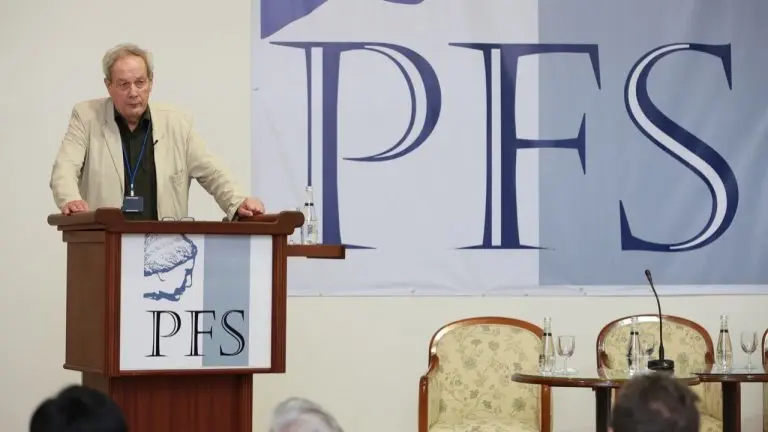I come from a modern European family. Growing up, we didn’t go to church, or have rituals which in any way gave me a sense of being an heir of Christendom. But our traditions still captured some kind of inexplicable ‘classical good.’ They were familial and evoked the wisdom of the past. Reflecting on this, the greatest tuition in the Transcendental that my parents gave to me was that of the dinner party: a show of beauty, tradition, and above all of service.
If I really try, I can recall very clearly scenes of dinner parties my family would host. They would always begin with an amuse bouche in front of the fireplace, with a glass of champagne in hand, and over light conversation our palettes would be readied for the delicate harmony and explosion of simple, local flavors. My mother, an elegant and beautiful woman, would vest herself in a long black apron, speeding back and forth between kitchen and living room to ensure the house was in perfect order, and that the guests were more than satisfied. My father, a charismatic hotelier of rather gentle but serious character, would steer conversation, ensuring a good balance between the sophisticated and the mindless. The guests in every sense were to be at ease; the entertainment we provided was a duty borne of amity, a relation of love culminating in regulated sacrifice. Of course, I was merely a child but I nonetheless got to engage and play a small, but important role, in this symphony of service.
Since I was a young boy, my mother would ask me to help her set the table, and with this I had one of my first encounters with orchestrated beauty. There were rules to everything. We had to be conscious of where the knives and forks were placed, the way the cloth napkins were folded, the patterns on the tablecloth and whether those paired best with the candle lighting. At first it was a mess. Then, I understood it. And by the time I was an adult, I naturally sought to replicate it for dinners with my college roommates. To take a line from the American essayist Elaine Scarry: Beauty, of course, is “that which brings copies of itself into being.” I just couldn’t help myself. There was something about reproducing the symmetry that was appealing; and I had some mild intuition of the Divine form when I broke bread with those closest to me.
My father had a singular expectation: he demanded that I understand and appreciate what I was eating—food was to be all but industrially masticated. And so, whether it was a piece of roquefort which he had picked out, or a simple steak frites—it would always be accompanied by an expectation that I would quietly sit and listen to the story behind the meal, prior to devouring it. Our dinners were a form of theatre for the first 15 years of my life. I was to understand that it was symbolism and narrative that elevated our ceremonies. There was a sort of real freedom that I found in being bound to the practices of those who came before me. They liberated me from infantile passions for nutritionless consumption—fast foods—and imbued in me a habit for slowing down which made me disdain any attempt to reduce me to nothing but an economic unit.
In many ways, the dinner party is where the heart of the Western tradition lies: it is ripe with symbols, veiled in allegory, and based in love. It elevates the fruits of our labor beyond mere nourishment, and brings laughter between companions. The ancient Greek symposium rested on the quality of poetry recitals and games, enabling those present to momentarily escape the productive realm—an encounter with the Highest Good in its derivative forms of art and play. In my family, we were never quite bourgeois enough for this pre-programmed entertainment, but the conversations we had and stories we told largely created the event. Dinner was only as good as the company.
Beyond the comfort of friendship and the stability of our roles as hosts, there was also a much-needed uncertainty which underpinned the dinner party, and which brought to it a marvelous authenticity. This was when the wine was running out, the cigarettes or cigars were lit, and everybody was speaking with utter relaxation.
In his lectures at the Collège de France, Michel Foucault presents the seminal concept of parrhesia—that is, ‘truth-telling’—which entails a candid risk-taking in truth. Drawing deeply from the term’s appearance in the Pauline epistles and Demosthenes’ ‘The Second Philic,’ Foucault presents two criteria for understanding the act of truth-telling. First, that the dialogue ought to challenge the relationship between interlocutors. And second, that a fundamental bond must manifest between the truth spoken and the thoughts of the subject. The latter occurs as a result of the risk taken in the recognition of the other’s thought. Here, Foucault is telling us that a full realization of truth, as one perceives it, is only possible in a communal setting. Without the akroatis—the listener—we forsake authenticity, simply because we are not being recognized in our act of truth-telling. In short, truth required both an author and a recipient. The dinner party thus reveals that authenticity can be forged only in relation to others.
Perhaps the most important instance of a host sharing his soul with his guests is that witnessed during the Last Supper. Christ literally offers himself—distributing the transubstantiated bread—to his disciples. The beauty of the act is in its didactic nature; we ought to love so deeply that we willingly give ourselves to those with whom we share a meal: be they Judas or Peter.
Kant used to emphasize that there was a duty of secrecy at the dinner table. This enabled social cohesion, and above all it would enable persons to offer themselves to those with whom they ate. The goal was to prevent the intellect from devouring itself in silent contemplation of its own condition, allowing a true sharing to take place, which prioritized the other. This has become more difficult at a modern dinner party, as a particular discourse now dominates public life, leaving those with unfashionable ideas to fear the consequences of their dissent. Social eating, with implicit rules for the sake of harmony, thus existed to create a tender window to the unique human person.
The fall of the West began with the corrosion of love. Its death will finally take place when relations of power usurp the place where love should abide. Prolonging the West means that dinner parties must be safeguarded. By holding the line in the private sphere, placing history, beauty, and service at the summit of our interactions, dinner parties enable succeeding generations to be steeped in all which is worthy of being appreciated, and thus begin their journey to becoming fully human. Ensuring the tradition of the dinner party is well practiced in our lives is indispensable if we want to recapture what has been lost to the West.






